Achievements and Announcements
ACHIEVEMENTS
- Researchers awarded over $940,000 in projects to grow Aboriginal tourism; and boost fire safety of steel structures
- UniSA’s MOD. wins two awards for innovative BROKEN exhibition
- UniSA student wins prized Malaysian award
- $50,000 grant awarded to researcher investigating the early detection of type 2 diabetes
- Accolades for research into teacher professional development and pain science education
- UniSA graduates shine at the Design Institute of Australia’s Graduates of the Year Awards
- Other recent award winners and grant recipients
ANNOUNCEMENTS
- Forestry Centre of Excellence launched in Mount Gambier
- New South Australian Sports Institute up and running
- Sparking connection to tackle loneliness
APPOINTMENTS
- Deputy Vice Chancellors appointed at Adelaide’s university for the future
- UniSA appoints new Director of Defence and Space
ACHIEVEMENTS
Researchers awarded over $940,000 in projects to grow Aboriginal tourism; and boost fire safety of steel structures
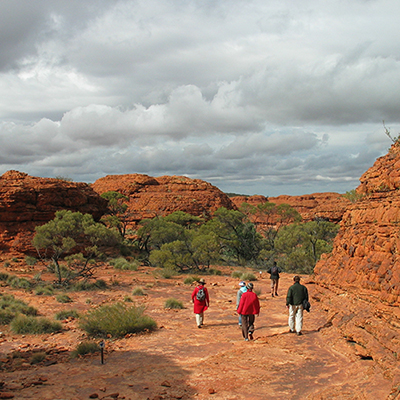
Two UniSA academics have received Australian Research Council (ARC) Discovery Early Career Researcher Awards (DECRA) to further their innovative research.
Dr Skye Akbar and Dr Wei Cai were collectively awarded more than $940,000 for projects that empower Aboriginal tourism operators to achieve better business outcomes; and improve the fire safety properties of steel structures.
The ARC DECRA scheme aims to advance early-career researchers who have demonstrated their capacity for high quality research and their potential for leadership.
UniSA Enterprise Fellow Dr Skye Akbar was awarded $456,561 for the project, Collaborative Trust Marks: Marketing Aboriginal Tourism.
This community-based project will work with Aboriginal tourism stakeholders to support increased participation in Aboriginal tourism and better economic outcomes for tourism operators, and provide advice for tourism industry policy makers.
Led by Dr Akbar, UniSA researchers will collaborate with Aboriginal tourism stakeholders to generate new knowledge on how to increase participation in Aboriginal tourism to promote environmental sustainability and connection to Country.
“This project brings together many elements imperative to supporting Aboriginal economic participation in remote Aboriginal tourism at the optimum time for the industry’s recovery from COVID-19,” Dr Akbar says.
“Our goal is to use best practice business research methods to work with Aboriginal tourism operators, and their economic ecosystems, to support their self-determined economic participation through tourism.”
Dr Akbar was recently made an inaugural member of the ARC Indigenous Forum, in recognition of her significant research experience.
Dr Wei Cai, a researcher based at Hong Kong Polytechnic University but who will join UniSA from December 2025 for three years while he undertakes his research project, was awarded $488,261 for the project Innovative Fire-Resistant Composite Coatings for Steel Structures.
Dr Cai’s project focuses on creating innovative fire-resistant polymer composite coatings designed to mitigate fire risks in steel structures.
“Improving the fireproof performance of steel structures to maintain their carrying capacity in case of fire, aims to help avoid catastrophic collapse and casualties, protecting the lives and properties of Australians,” Dr Cai says.
“I aim to create new flame-retardant strategies superior to past approaches and to develop commercially viable and highly efficient fireproof coatings.”
UniSA’s MOD. wins two awards for innovative BROKEN exhibition
UniSA’s futuristic museum of discovery MOD. has received two prestigious international awards for its latest exhibition, Broken.
The International Committee for Museums and Collections of Science and Technology (ICOM) awarded Broken the CIMUSET Award, which recognises projects that contribute to the creation of a more equal, sustainable and peaceful world. It celebrates excellence and the role science museums play as centres of engagement, education and reflection.
CIMUSET is based on the French name of the awarding committee: C(omité) I(nternational) (des) MU(sées) (de) S(ciences) E(t) (des) T(echniques).
“This forward-thinking exhibition stands out for its multidisciplinary approach to addressing the complex challenges humanity faces today, from environmental degradation to systemic issues in housing and education,” the committee wrote in announcing MOD.’s win.
In addition, Broken won the Asia Pacific Network of Science & Technology Centres (ASPAC) Creative Science Exhibit Award.
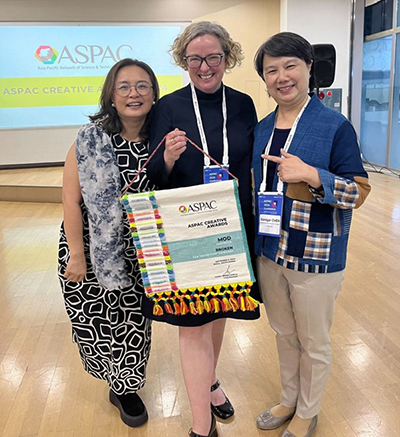 Dr Kristin Alford travelled to Gwacheon, South Korea, to accept the ASPAC award and participate in the three-day ASPAC Conference.
Dr Kristin Alford travelled to Gwacheon, South Korea, to accept the ASPAC award and participate in the three-day ASPAC Conference.The ASPAC award recognises outstanding exhibits for their scientific accuracy, creativity and value to visitors.
Director of MOD., Dr Kristin Alford, says the awards are a sign of distinction within the realm of technology museums and science centres.
“This acknowledges the profound role that museums like MOD. have in cultivating a sense of shared heritage, fostering inclusivity and promoting sustainability,” she says.
“We’re proud to see MOD. recognised for embodying the principles of inclusivity, innovation and participatory practices.”
Dr Alford travelled to Gwacheon, South Korea, to accept the ASPAC award and participate in the three-day conference celebrating empathy, communication and science.
The BROKEN exhibition explores alternate worlds and imagines different ways of shaping a better future. The exhibits within ask questions imagining new ways of being: How might trees have a voice in politics? What does putting nature first look like? Is it possible to have somewhere to live when no one owns a house?
The exhibition is available to visit until 22 November.
UniSA student wins prized Malaysian award
A UniSA student has been recognised for her exceptional achievements as part of awards for outstanding international students from Malaysia.
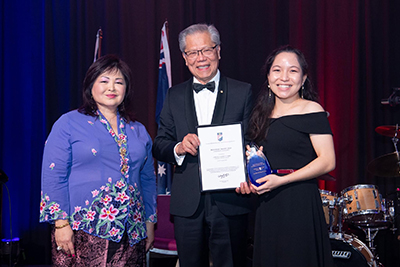 Australia-Malaysia Business Council SA president Dr Evelyn Yap OAM and SAHMRI Board chair Hieu Van Le AC with 2024 Merdeka Award recipient Joelle Chong Ci Ann. The Merdeka Awards recognise outstanding international students from Malaysia.
Australia-Malaysia Business Council SA president Dr Evelyn Yap OAM and SAHMRI Board chair Hieu Van Le AC with 2024 Merdeka Award recipient Joelle Chong Ci Ann. The Merdeka Awards recognise outstanding international students from Malaysia.Joelle Chong Ci Ann, a promising final year Bachelor of Pharmacy (Honours) student from Selangor in Malaysia’s west, was one of only four students to receive a prestigious 2024 Merdeka Award.
As a worthy recipient of the Merdeka Award, which acknowledges outstanding academic excellence and significant contributions to bilateral relationships between South Australia and Malaysia, Joelle has a strong academic record, having received the Chancellor’s Letter of Commendation in 2023, which placed her in the top 5% of her studies, along with an International Merit Scholarship.
Facing the challenges that come with moving to a new country, Joelle says the award is testament to the hard work she has mustered over the past year and a half.
“It shows that all my efforts are not in vain and that it’s producing good outcomes not only for myself, but for the friends and family who have supported me,” she says.
“It was not easy for them (Joelle’s family) to send me here. Distance is always tough with loved ones. This award shows that I’m succeeding.”
Joelle says the prize, which also includes a monetary award, will aid with her goal of becoming a registered pharmacist with the Pharmacy Board of Australia.
“It will help alleviate a huge proportion of the registration fees, which is really helpful.”
In addition to her academic prowess, Joelle has championed respect, harmony and multiculturalism, which have been key pillars of her Malaysian upbringing, by immersing herself in all facets of South Australia’s professional and cultural communities.
This has included her work in providing culturally safe patient care to customers at a suburban Adelaide chemist; as a volunteer aiding professional pharmacists with over-the-counter advice to attendees at internationally renowned festival, WOMADelaide; and contributing to fundraising event SAHMRI Bright Walk, to help researchers move one step closer to life-saving discoveries.
She has also developed a research project with SA Pharmacy aimed at improving the communication barriers hospital and community pharmacies often face when patients are discharged, helping to ensure patient care is not compromised.
Joelle has also found the time to lend her musical talent to Trinity Church Adelaide as a keyboardist with the congregation’s band.
Inspired to become a pharmacist after witnessing the obstacles her family and friends grappled with, in trying to understand appropriate medicine usage as a teenager, Joelle is striving to provide the best possible pharmaceutical care to people from all walks of life.
“I thought then if I could learn more about medicines, it would not only help my family but many others since a huge amount of the population uses medicines, especially the elderly,” she says.
“I hope that I can educate people in the future and approach them in a way that’s most beneficial to them, so they can make informed decisions about their medicines.”
Australia-Malaysia Business Council (AMBC) (South Australia Chapter) president Dr Evelyn Yap OAM, who presented Joelle with her award, says the judges were astonished by the high calibre of applicants.
“This year's selected recipients demonstrated an extraordinary level of excellence, marked by their impressive academic accomplishments, strong participation in extracurricular activities, and contributions to their communities,” Dr Yap says.
“These individuals are ideal representatives for South Australia, further enhancing our relationship with Malaysia.”
The AMBC SA Chapter 2024 Merdeka Awards were celebrated at the Adelaide Convention Centre. The event is an annual charity fundraiser which commemorates Malaysia's Independence Day and brings together corporate and government representatives from Malaysia and Australia, as well as prominent South Australian entrepreneurs.
$50,000 grant awarded to researcher investigating the early detection of type 2 diabetes
A UniSA researcher has been awarded $50,000 to explore new mechanisms for the early detection and understanding of type 2 diabetes mellitus (T2DM).
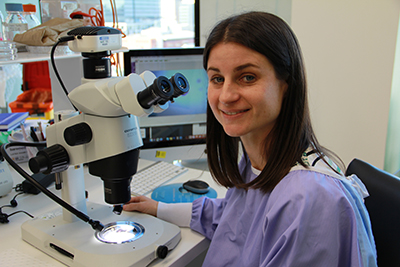 Dr Jantina Manning has been awarded $50,000 to investigate the early detection of type 2 diabetes mellitus
Dr Jantina Manning has been awarded $50,000 to investigate the early detection of type 2 diabetes mellitusThrough the Diabetes SA Research Grants Program, Dr Jantina Manning, Research Fellow at the Centre for Cancer Biology, aims to investigate whether lower levels of a recently discovered gene called NEDD4L can serve as an early marker for T2DM.
T2DM is the most common type of diabetes, where insulin resistance causes high blood glucose levels that can lead to kidney disease – known as nephropathy – in 40% of patients.
Significantly lower levels of NEDD4L are found in the kidneys of people and mice with diabetes.
In animal studies undertaken by Dr Manning, diabetic mice were bred with mice lacking NEDD4L in their kidneys, creating diabetic mice with no NEDD4L gene. These mice exhibited normal drinking and urination behaviour with healthy blood glucose levels, indicating that the presence of the gene could be connected to T2DM.
Dr Manning says investigating NEDD4L levels in urine samples from diabetic people could unlock crucial information about the disease.
“We hope to discover if NEDD4L levels can predict diabetes and associated kidney disease progression, and if testing these levels in patients could serve as a warning sign of T2DM,” she says.
“The incidence of diabetes and nephropathy is becoming increasingly common, but issues with kidney function often aren’t found until the diabetes has progressed.
“If we can understand disease progression through NEDD4L levels, this could mean faster, better treatment of T2DM down the road.”
The results from Dr Manning’s research will pave the way for future studies exploring earlier disease detection and more effective treatment of diabetes.
Accolades for research into teacher professional development and pain science education
A research project involving iterative development teacher professional development models; and another that led to improvements in how pain science education is delivered to healthcare professionals, have been jointly recognised as the University’s most outstanding research theses.
UniSA education researcher Dr Sam Fowler and Research Fellow Dr Hayley Leake have been jointly awarded the 2024 Ian Davey Research Thesis Prize, which was established by UniSA to acknowledge the most outstanding research thesis by a UniSA Higher Degree by Research student leading to a Doctor of Philosophy degree. The prize is worth $5000.
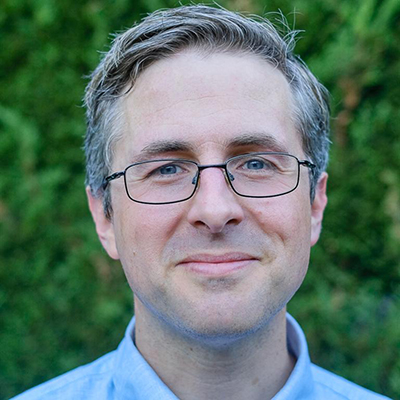
For his thesis, Dr Sam Fowler completed a design-based research project that explored how epistemic cognition could deepen teachers’ reasoning as applied to the method and practice of teaching. His innovative approach to the project involved iterative development of models for teacher professional development. He used each iteration to engage with a different industry partner, with his conclusions enabling real-world improvements for industry partners and students.
Dr Fowler says he was “quite surprised” to hear he was joint winner of the Ian Davey Research Thesis Prize.
“This was not my aim in completion,” he says. “Rather, I saw the thesis as a result of my learning process and the impetus for post-doctoral work.”
He took a groundbreaking approach to his thesis within his field by including six published papers. Rather than producing a portfolio of publications, he produced a thesis ‘with’ publication. In turn, he used the thesis to stitch together a unifying narrative of an expansive program of research.
“I tended to think of the papers as building key building blocks to the design principles I was trying to develop,” he says.
Dr Fowler continues his focus on STEM teaching practices as a lecturer in UniSA Education Futures and as a member of the UniSA Education Futures Outreach team.
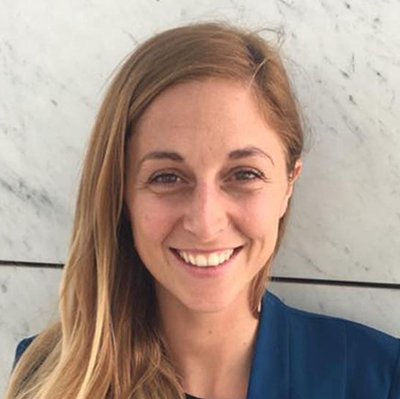
Dr Hayley Leake is a scientist and physiotherapist dedicated to improving the management of chronic pain in adolescence. Her innovative and real-world used a mixed methods study to identify valued content and then evaluated 10 years of consumer feedback. Her research findings have led directly to changes in education content and resources adopted by public-facing pain education programs.
Dr Leake’s work has seen directly guided interventions being tested in an NHMRC-funded trial considering pain education and adults experiencing Complex Regional Pain Syndrome. Her approach is distinctive for her commitment to ensuring her research reaches both clinical and community audiences and stakeholders. She shares her research in a range of ways including public talks, podcasts, mainstream media and social media.
As well as being joint winner of the Ian Davey Research Thesis Prize, Dr Leake won both the South Australian Science Excellence Innovation Award for PhD Research Excellence and the Ruth Grant Prize for Academic Excellence (awarded to the UniSA student with the highest academic achievement in the Master of Physiotherapy).
Read more on the Ian Davey Research Thesis Prize website.
UniSA graduates shine at the Design Institute of Australia’s Graduates of the Year Awards

A UniSA product design graduate has taken out the top South Australian award at the Design Institute of Australia Graduate of the Year Awards (GOTYAs).
Zenith Zaccara, who studied a Bachelor of Design (Product Design) at UniSA, was named the SA/NT Graduate of the Year at the GOTYAs.
The awards, which have been running since 2003, support and celebrate exceptional Australian designers as they start out their careers. The GOTYAs provide design graduates with pivotal, real-life feedback from experienced designers and industry figures to prepare them for employment within the Australian design industry.
UniSA Bachelor of Interior Architecture graduates Jake Lane and Natasha Hutton were also recognised at the awards with Jake being commended in the Place category in higher education and Natasha winning the category.
SA/NT Design Institute of Australia Council chair Dr Nathan James Crane says it’s always a “pleasure to celebrate the achievements of emerging designers”.
“The GOTYAs allows the design community to come together and acknowledge the groundswell of talent within our state,” he says.
All winners at the category, state and national levels go in the running to win the overall national prize, the Madeline Lester Australian Graduate of the Year Award, which will be presented in Melbourne on 14 November at the Designers Australia Awards.
Other recent award winners and grant recipients
Other recent award winners and grant recipients from UniSA include:
- The Australian Academy of Technological Sciences and Engineering (ATSE) has named its 2024 Fellows with UniSA Professor in Structural Engineering Yan Zhuge recognised as a waste conversion trailblazer. ATSE cited Prof Zhuge’s “impressive track record developing innovative green materials”.
- The Academy of Social Sciences in Australia has recognised Professor Barabara Comber by making her a 2024 fellow.
- The Australian-French Association for Research and Innovation (AFRAN) has awarded a grant to a project led by UniSA Adjunct Professor David Ness to support a City of Adelaide initiative to convert vacant properties and shops to housing to ease the housing crisis. Learning from French experience and case studies, the project, Australian-French Collaboration for Sufficiency and Adaptive Reuse, aims to extend and support the city council’s Adaptive Reuse City Housing Initiative, while overcoming unease about adapting vacant office buildings to housing, as an alternative to demolish and rebuild.
ANNOUNCEMENTS
Forestry Centre of Excellence launched in Mount Gambier
The State Government has released new illustrations of the Forestry Centre of Excellence (FCoE) being built in Mount Gambier and officially launched in October.
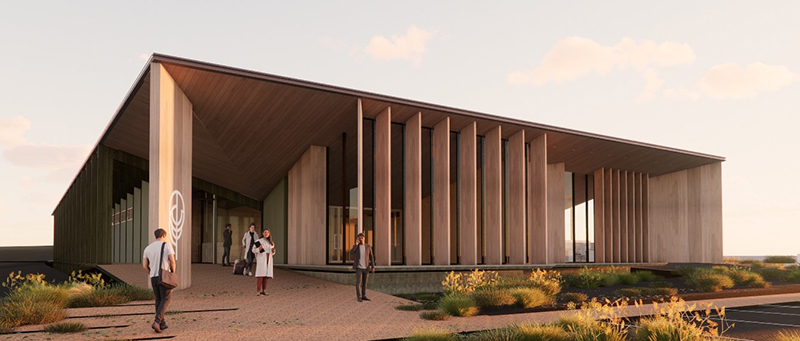 An artist's impression of the Forestry Centre of Excellence, due to be built on UniSA's Mount Gambier campus in 2025.
An artist's impression of the Forestry Centre of Excellence, due to be built on UniSA's Mount Gambier campus in 2025.The Centre is a collaborative project between the State Government, UniSA and the forest industry. It will be built on the same site as the UniSA Mount Gambier campus, the new Mount Gambier Technical College and the Mount Gambier TAFE, providing a unique opportunity to create an education, training and research precinct.
The design for the facility is due to be finalised in November 2024 with building construction due to commence in April 2025 and completion expected in January 2026.
Vital research underway in temporary facilities was showcased at a special launch on site in early October and includes projects on:
- structural timber market access
- improving safety
- fire detection from cameras and satellites
- suppression, recovery and analysis of digital forestry data using artificial intelligence
- immersive data analytics using VR and AR to understand the implications of climate change on plantation growth yield and water use.
Following a global search, Professor Jeff Morrell has been appointed as the Forestry Centre of Excellence’s inaugural director, due to commence in mid-January 2025. Previously, he was director for the Centre for Timber Durability and Design Life based at the University of the Sunshine Coast.
The FCoE links to the forest industry and its key attributes of collaboration, connection and partnerships through its research, training education, development and extension activities. This has been reflected in the new FCoE brand of interlocking abstract trees.
In launching the FCoE, SA Premier Peter Malinauskas described the Green Triangle plantation forest region as “one of the powerhouses of the Australian forest industry”.
“The South Australian portion of the region contributes more than $860 million to the state’s gross product annually – making it one of our most productive primary industry sectors,” Malinauskas said.
“We are delivering on our election commitment to establish a world-leading Forestry Centre of Excellence to strengthen this already thriving industry.”
UniSA Chancellor John Hill, who attended the launch, said the University was honoured to host the new Forestry Centre of Excellence, which has evolved from Forest Research Mount Gambier, established in 2018 by the State and Federal Government, UniSA and the forestry industry.
“The model of recruiting UniSA researchers into the forestry industry has resulted in a more efficient, safer, progressive and profitable industry, establishing standards for best practice,” he said.
“Together with the State Government, we are proud to continue this partnership and help advance research and development projects to ensure the industry’s economic prosperity committing more than $6 million towards the Centre’s operations and building along with significant in-kind support.”
For further information visit the PIRSA Forestry Centre of Excellence webpage.
New South Australian Sports Institute up and running
South Australian Sports Institute (SASI) athletes have had a first look at their new, state-of-the-art Mile End facility ahead of operations commencing earlier this month.
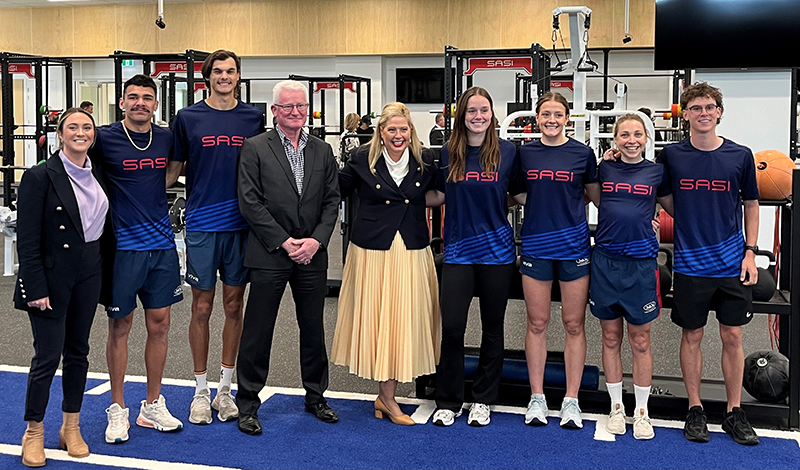 Assistant Minister for Junior Sport Participation (far left) Rhiannon Pearce; UniSA Allied Health and Human Performance Executive Dean (fourth from left) Professor Jon Buckley; and Recreation and Sport Minister (centre) Katrine Hildyard with SASI athletes at the pre-launch of the new sporting facilities in Mile End.
Assistant Minister for Junior Sport Participation (far left) Rhiannon Pearce; UniSA Allied Health and Human Performance Executive Dean (fourth from left) Professor Jon Buckley; and Recreation and Sport Minister (centre) Katrine Hildyard with SASI athletes at the pre-launch of the new sporting facilities in Mile End.The nearly $90 million SASI build has been designed to give South Australian and SA-based athletes a competitive edge, featuring nation-leading spaces including:
- Strength and conditioning gym, fit with five lane synthetic turf testing space (three lanes are 60 metres and two lanes are 40 metres) and anti-gravity treadmill.
- Environmental chamber for athlete testing under a range of temperature, hypoxic and humidity conditions.
- Full sized indoor sprung timber court and half court movement studio, designed for instant performance analysis under individual and team modes.
- Ergometer training space, home to the SASI rowing and canoe/kayak programs.
- Physiology laboratory and athlete health rooms, fit out for allied health partners.
- Athlete recovery centre, complete with athlete nutrition zone.
- Biomechanics and exercise physiology laboratories fit for allied health partners and for students to learn about the role that forces play in movement and physiological responses to exercise and training.
The State Government has invested $68 million towards the world-class sport, research and education hub for high performance athletes, coaches and university students.
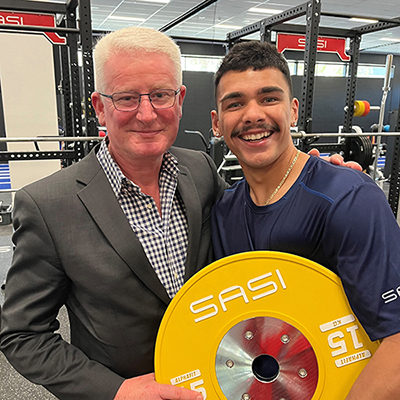 Professor Jon Buckley and SASI athlete and boxer Callum Peters.
Professor Jon Buckley and SASI athlete and boxer Callum Peters.UniSA, as project partner, has contributed a further $20 million for capital costs, which will see the UniSA Sports Science Hub open on the second floor in the coming months, with high performance sport science laboratories and teaching spaces for students undertaking a range of undergraduate and postgraduate degrees.
The building will also be home to the Office for Recreation, Sport and Racing, which was instrumental in the design and building process, working alongside COX Architecture and Hansen Yuncken.
The new facility launches as one of the best high-performance sports precincts in the country.
Recreation and Sport Minister Katrine Hildyard says the $90 million development is a key part of the Mile End sporting precinct, which includes the National Centre for Sports Aerodynamics, upgraded Athletics Stadium and soon to be redeveloped SA Netball Centre.
“We know that the new SASI will enable every athlete who uses this facility to have the best possible support around them as they strive to realise their ambition to compete at the highest level,” she says.
SASI director Keren Faulkner says their partnership with UniSA will provide “great opportunities to promote the way research, science and academia can work together with sport”.
UniSA Allied Health and Human Performance Executive Dean Professor Jon Buckley says the University is pleased to partner with the State Government and South Australian Sports Institute on the world-class development.
“The collaboration draws upon the expertise of SASI and UniSA to dually advance the preparation of high-performance athletes and educate the elite sports workforce of the future,” Prof Buckley says.
The Mile End sports precinct is set to be a drawcard for international sports teams with world-renowned organisations having already expressed their interest in basing themselves in Adelaide to use these amenities.
A SASI open day event will be held early next year where members of the public will be invited to come along and take a tour of the new facility.
Sparking connection to tackle loneliness
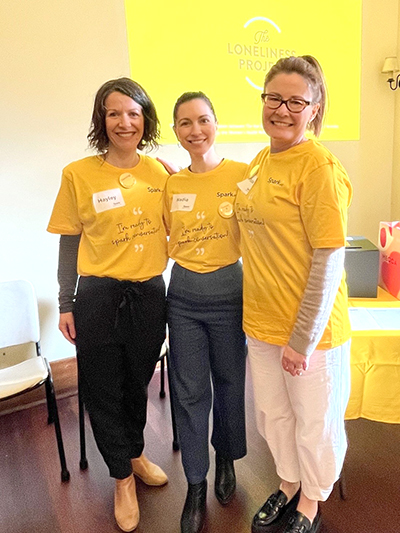 Spark coordinator Hayley Everuss with Dr Nadia Corsini and Dr Jodie Scott.
Spark coordinator Hayley Everuss with Dr Nadia Corsini and Dr Jodie Scott.UniSA researchers have teamed up with the Hut Community Centre in the Adelaide Hills to help tackle a worldwide loneliness epidemic on a local scale.
On the back of recent statistics that suggest one in four Australians are persistently lonely, an initiative called Spark: Igniting Human Connection has evolved from The Loneliness Project, created by UniSA and The Hut.
A series of workshops hosted by The Hut at Aldgate earlier this year has identified a number of solutions for midlife women looking to build connections in their community, including cafe meetups, social activities, personal development programs and a podcast that shines the light on loneliness.
UniSA researchers Dr Nadia Corsini and Dr Jodie Scott have helped coordinate the Spark initiative, along with 22 Adelaide Hills women.
With additional funding from the Office for Ageing Well, men are now being invited to codesign workshops in the Adelaide Hills, with a view to expanding the program to other demographics and locations.
“Humans are designed to be social beings and relationships are integral to our survival,” Dr Corsini says.
“A myriad of social changes over time has resulted in our communities feeling less connected, and individuals experiencing increasing levels of loneliness.
“The World Health Organisation has declared loneliness and social isolation as a global epidemic. It has the same health impacts as obesity, or smoking 15 cigarettes a day, as well as an increased risk of depression and cognitive decline.”
Dr Scott says Spark is also working with councils, local businesses and other community organisations to get on board with Spark’s model of engagement.
The Loneliness Project is funded by the Women’s Health Research Translation and Impact Network, with support from Health Translation SA.
More information can be found in this article published in Frontiers.
APPOINTMENTS
Deputy Vice Chancellors appointed at Adelaide’s university for the future
Adelaide University has announced the appointment of its first Deputy Vice Chancellors (DVCs).
The selection of the roles marks a significant milestone in the creation of a globally recognised institution committed to educational excellence and societal impact.
The new leadership group comprises staff from both UniSA and the University of Adelaide.
An extensive recruitment process was conducted independently by nation-leading firm, Boyden Australia.
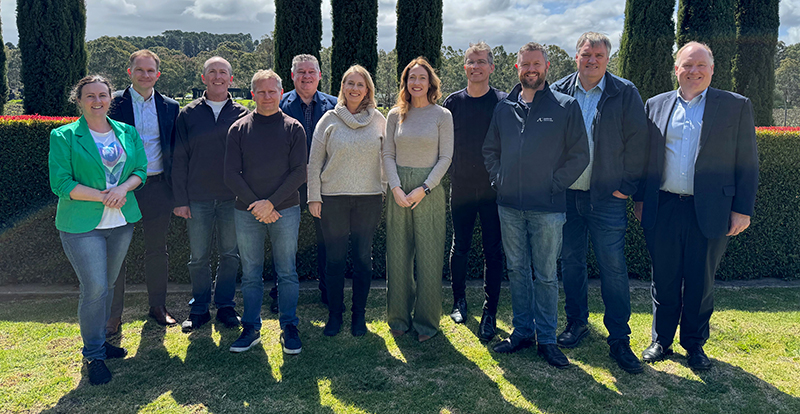 (L-R) Paula Ward, Tom Steer, Paul Beard, Bruce Lines, Professor Steve Larkin, Professor Joanne Cys, Professor Jessica Gallagher, Professor Peter Høj AC, Professor David Lloyd FTSE, Professor John Williams AM and Professor Anton Middelberg FTSE.
(L-R) Paula Ward, Tom Steer, Paul Beard, Bruce Lines, Professor Steve Larkin, Professor Joanne Cys, Professor Jessica Gallagher, Professor Peter Høj AC, Professor David Lloyd FTSE, Professor John Williams AM and Professor Anton Middelberg FTSE.The Adelaide University DVCs are:
- Deputy Vice Chancellor Academic: Professor John Williams AM
- Deputy Vice Chancellor Corporate: Paul Beard
- Deputy Vice Chancellor Indigenous: Professor Steve Larkin
- Deputy Vice Chancellor International & External Engagement: Professor Jessica Gallagher
- Deputy Vice Chancellor People & Culture: Paula Ward
- Deputy Vice Chancellor Research & Innovation: Professor Anton Middelberg FTSE
- Deputy Vice Chancellor Student Experience & Success: Tom Steer
- Provost & Deputy Vice Chancellor: Professor Joanne Cys.
Adelaide University co-Vice Chancellors, Professor David Lloyd and Professor Peter Høj, said the selection of the DVCs will provide strong foundational leadership through this time of transition and transformation.
“We congratulate our newly appointed colleagues who we know will provide the vision, expertise and guidance in realising our collective ambitions for a new university for the future,” Professors Lloyd and Høj said.
The appointed DVCs began their roles on 1 October 2024 ahead of Adelaide University commencing operations on 1 January 2026.
UniSA appoints new Director of Defence and Space
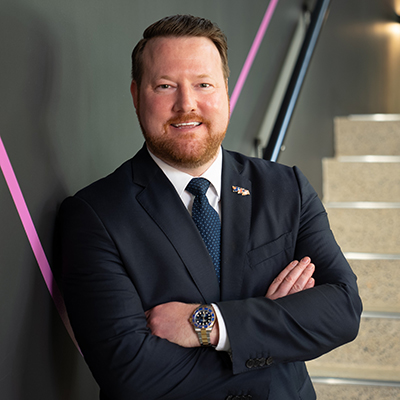
UniSA has appointed Ryan McClenaghan as its new Director of Defence and Space, responsible for steering research and education across the sector at a pivotal time in the nation’s defence history.
McClenaghan has made a substantial impact in his most recent role as director of Defence and National Security at Fleet Space Technologies, one of Australia’s leading satellite companies with a global presence. During his three-year tenure at Fleet, McClenaghan secured millions of dollars in defence contracts.
At UniSA, he will draw on his extensive international experience with defence companies, particularly in the United States and United Kingdom, including working across the AUKUS partnership with government and industry.
Originally from Belfast, Northern Ireland, McClenaghan moved to Australia in 2006, co-founding two startup companies and working in various roles in the intervening years, including with the Australian Industry Group and Micro-X, an award-winning ASX-listed x-ray technology company.
Announcing the appointment, UniSA Director: Enterprise Partnerships, Peter Stevens, says McClenaghan will strengthen the University’s defence and space footprint with industry and governments in Australia and worldwide.
“South Australia is at the forefront of Australia’s space and defence sector, responsible for delivering a $368 billion nuclear submarine construction project for the AUKUS alliance, hosting the Australian Space Agency, and supporting more than 100 space-related companies,” Stevens says.
“Academia, industry and government need to work hand-in-hand to ensure the sector thrives, highlighting the importance of this appointment. Ryan and his experienced team will work closely to bridge the gap between innovation and operational efficiency as well as collaborating to develop the skills required to deliver on our commitments.”
UniSA has bolstered its sector credentials in recent years with programs including the Global Executive MBA in Defence and Space, software degree apprenticeships with BAE Systems and ASC, the Venture Catalyst Space program and the Southern Hemisphere Space Studies Program.
“All these underpin our strengths in research and collaboration in areas such as the SmartSat CRC and iLAuNCH Trailblazer program, which will be amplified by the creation of Adelaide University in 2026, bringing together the state’s two biggest universities,” Stevens says.
Excited by the challenge, McClenaghan says he is looking forward to leading UniSA’s defence and space strategy at such a critical time.
“As Australia seeks to grow its sovereign defence and capabilities, and Adelaide University is created, it is more important than ever that we align research with industry engagement and technology transfer and support the skills required for the future,” McClenaghan says.
He commenced in his new role on Monday 14 October.
Other Stories
- New lunar distress system could safeguard future astronauts
- When a child hurts, validating their pain may be the best first aid
- Is chocolate milk a good recovery drink after a workout? A dietitian reviews the evidence
- When First Nations students exchange culture with First Nations peoples abroad: ‘Life-changing’
- From the Vice Chancellor: Balancing rights and responsibilities
- Achievements and Announcements
- Ageing fabulously: 3MT on a winner for the LGBTI+ older community
- UniSA international students win prized internships with Adelaide Football Club
- In Pictures: September graduation ceremonies
- The latest books from UniSA researchers




